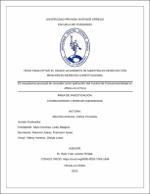Mostrar el registro sencillo del ítem
El mecanismo procesal de consulta como aplicación del Control de Convencionalidad ex officio en el Perú
| dc.contributor.advisor | Lozano Peralta, Raúl Yvan | |
| dc.contributor.author | Mazmela Anticona, Valeria Fernanda. | |
| dc.creator | Mazmela Anticona, Valeria Fernanda. | |
| dc.date.accessioned | 2024-01-08T14:31:36Z | |
| dc.date.available | 2024-01-08T14:31:36Z | |
| dc.date.issued | 2024 | |
| dc.identifier.uri | https://hdl.handle.net/20.500.12759/16712 | |
| dc.description.abstract | La Tesis titulada “El mecanismo procesal de consulta como aplicación del Control de Convencionalidad ex officio en el Perú”; estuvo orientada a determinar la importancia de regular el mecanismo procesal de Consulta como aplicación del Control de Convencionalidad ex officio en el país. Por consiguiente, se formuló como como problemática: ¿Por qué es importante regular el mecanismo procesal de consulta como aplicación del Control de Convencionalidad ex officio en el Perú? En efecto, se planteó como hipótesis: “Resulta importante la regulación del mecanismo procesal de consulta como aplicación del Control de Convencionalidad ex officio en el Perú porque permitiría que la Sala Constitucional y Social de la Corte Suprema de Justicia realice una revisión judicial y constate si el juez ha resuelto correctamente la incompatibilidad entre una disposición convencional y una norma nacional con rango de ley o infralegal, inaplicando esta última en el caso concreto, brindando una mayor seguridad jurídica al fallo judicial y garantizando el cumplimiento efectivo de los compromisos internacionales adoptados por el país”. Acorde con los métodos utilizados se encuentran el método lógico como el: método inductivo, método deductivo, método descriptivo y método analítico-sintético. Otro método aplicado fue el jurídico, específicamente: método exegético, método hermenéutico, método dogmático y método comparativo. Respecto a las técnicas utilizadas se encuentran la observación, el análisis documental y las encuestas. Los instrumentos aplicados fueron las fichas bibliográficas, las fichas de contenido, síntesis y comentario, la ficha de observación y la guía de encuestas. La presente investigación se basa en la relevancia de regular en el Código Procesal Constitucional Peruano, el mecanismo procesal de consulta, cuando los jueces internos apliquen Control de Convencionalidad ex officio debido a que la instancia superior al realizar una revisión de los fallos judiciales, estaría garantizando la protección idónea de los derechos humanos. | es_PE |
| dc.description.abstract | The Thesis entitled ““The procedural mechanism of consultation as an application of the Control of Conventionality ex officio in Peru““; It was oriented to determine the importance of regulating the procedural mechanism of consultation as an application of the Control of Conventionality ex officio in the country. Therefore, it was formulated as a problem: Why is it important to regulate the procedural mechanism of consultation as an application of the Control of Conventionality ex officio in Peru? Indeed, the hypothesis was proposed: ““The regulation of the Consultation procedural mechanism as an application of the Ex officio Control of Conventionality in Peru is important because it would allow the Constitutional and Social Chamber of the Supreme Court of Justice to carry out a judicial review and verify whether the judge has correctly resolved the incompatibility between a conventional provision and a national norm with the stats of law or infralegal, not applying the latter in the specific case, providing greater legal certainty to the judicial ruling and guaranteeing effective compliance with the international commitments adopted by the country. According to the methods used are the logical method such as: inductive method, deductive method, descriptive method and analytical-synthetic method. Another applied method was the legal one, specifically: exegetical method, hermeneutical method, dogmatic method and comparative method. Regarding the techniques used are observation, documentary analysis and surveys. The applied instruments were the bibliographic records, the content, synthesis and commentary records, the observation record and the interview surveys. The present investigation is based on the relevance of regulating in the Peruvian Constitutional Procedural Code, the procedural mechanism of consultation, when internal judges apply Control of Conventionality ex officio because the higher instance, when carrying out a review of judicial decisions, would be guaranteeing adequate protection of human rights. | es_PE |
| dc.description.uri | Tesis | es_PE |
| dc.format | application/pdf | es_PE |
| dc.language.iso | spa | es_PE |
| dc.publisher | Universidad Privada Antenor Orrego | es_PE |
| dc.relation.ispartofseries | M_DERE_233 | |
| dc.rights | info:eu-repo/semantics/openAccess | es_PE |
| dc.rights.uri | https://creativecommons.org/licenses/by/4.0/ | es_PE |
| dc.source | Universidad Privada Antenor Orrego | es_PE |
| dc.source | Repositorio Institucional UPAO | es_PE |
| dc.subject | Mecanismo Procesal de Consulta | es_PE |
| dc.title | El mecanismo procesal de consulta como aplicación del Control de Convencionalidad ex officio en el Perú | es_PE |
| dc.type | info:eu-repo/semantics/masterThesis | es_PE |
| thesis.degree.grantor | Universidad Privada Antenor Orrego. Escuela de Postgrado | es_PE |
| thesis.degree.name | Maestro en Derecho Constitucional | es_PE |
| thesis.degree.discipline | Maestría en Derecho | es_PE |
| dc.subject.ocde | http://purl.org/pe-repo/ocde/ford#5.05.00 | es_PE |
| renati.advisor.orcid | https://orcid.org/0000-0002-7043-1848 | es_PE |
| renati.author.dni | 72363829 | |
| renati.advisor.dni | 40079448 | |
| renati.type | http://purl.org/pe-repo/renati/type#tesis | es_PE |
| renati.level | http://purl.org/pe-repo/renati/level#maestro | es_PE |
| renati.discipline | 421297 | es_PE |
| renati.juror | Silva Chinchay, Leiby Milagros | |
| renati.juror | Mauricio Juárez, Francisco Javier | |
| renati.juror | Villena Veneros, Sheyla Lisset | |
| dc.publisher.country | PE | es_PE |




